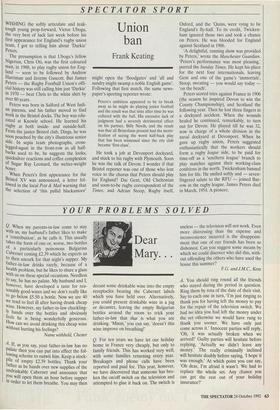SPECTATOR SPORT
Union ban
Frank Keating
WISHING the softly articulate and teak- tough young prop-forward, Victor Ubogu, the very best of luck last week before his first appearance for England's rugby union team, I got to telling him about `Darkie' Peters.
The presumption is that Ubogu's fellow Nigerian, Chris Oti, was the first coloured man, in 1988, to play rugby union for Eng- land — soon to be followed by Andrew Harriman and Jeremy Guscott. But James Peters — the Rugby Football Union's offi- cial history was still calling him just `Darkie' in 1970 — beat Chris to the white shirt by over 80 years.
Peters was born in Salford of West Indi- an parents, and his father moved to find work in the Bristol docks. The boy was edu- cated at Knowle school. He learned his rugby at both inside- and outside-half. From the junior Bristol club, Dings, he was soon poached by the city's illustrious senior Side. In sepia team photographs, cross- legged-squat in the front-row as all half- backs used to be, he suggests the looks, quicksilver reactions and coffee complexion of Sugar Ray Leonard, the welter-weight boxer.
When Peters's first appearance for the Bristol XV was announced, a letter fol- lowed in the local Post & Mail warning that the selection of 'this pallid blackamoor' might open the 'floodgates' and 'all and sundry might swamp a noble English game'. Following that first match, the same news- paper's sporting reporter wrote:
Peters's ambition appeared to be to break away as he might do playing junior football and the result was that time after time he was collared with the ball. His excessive lack of judgment had a severely detrimental effect on his partner, Billy Needs, and the result was that all Bristolians present had the morti- fication of seeing the worst half-back play that has been witnessed since the city club became 'first-class'.
He took a job at Devonport dockyard, and stuck to his rugby with Plymouth. Soon he was the talk of Devon. I wonder if that Bristol reporter was one of those who lent voice to the chorus that Peters should play for England? Dai Gent, Old Cheltonian and soon-to-be rugby correspondent of the Times, and Adrian Stoop, Rugby itself, Oxford, and the 'Quins, were vying to be England's fly-half. To its credit, Twicken- ham ignored those two and took a chance on Peters. He was blooded for England against Scotland in 1906.
'A delightful, running show was provided by Peters,' wrote the Manchester Guardian. 'Peters's performance was most pleasing,' purred the Sunday Times. He kept his place for the next four internationals, leaving Gent and one of the game's 'immortals', Stoop, sweating — you would say today — 'on the bench'.
Peters scored tries against France in 1906 (the season he inspired Devon to win the County Championship), and Scotland the following year. Then he lost three fingers in a dockyard accident. When the wounds healed he continued, remarkably, to turn out for Devon. He played till he was 32, now in charge of a whole division in the naval dockyard at Devonport. When he gave up rugby union, Peters suggested enthusiastically that the workers should form a rugby league side, to be paid for time-off as a 'southern league' branch to play matches against their working-class confreres in the north. Twickenham banned him for life. He smiled softly and — seven- fingered salute to the RFU — joined Bar- row in the rugby league. James Peters died in March, 1954. A pioneer.


































































 Previous page
Previous page